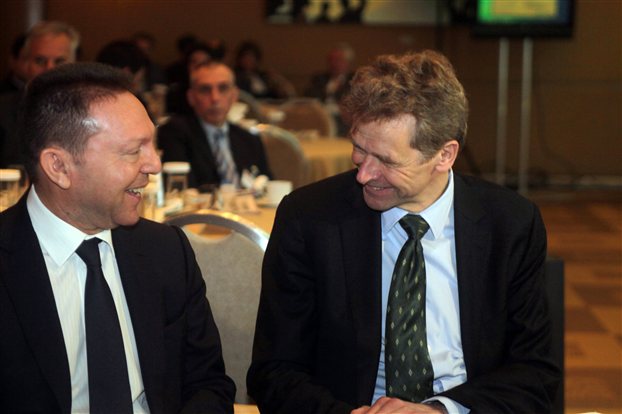Photos: Naftemporiki
Greece has started another round of talks with its international lenders whose representatives Paul Thomsen, from the International Monetary Fund, Klaus Masuch, from the European Central Bank, and Mathias Morse, from the European Commission, arrived in Athens yesterday. Their first meeting with Minister of Finance Yiannis Stournaras lasted four hours and, according to the Greek media, both parties have agreed on a sustainable primary budget deficit and lower recession than expected.
It seems that the difference between the estimates of the Greek government and the supervisory Troika regarding the recession is about 0.1%. I.e. both parties agree that this year's recession will be around 3.8% - 3.9% instead of 4.2% as they had previously thought. Their assessments of the state budget, which focuses on achieving a small, sustainable primary surplus, are similar too.

The main topic of the discussions during this first meeting was the implementation of the budget as well as the accounting and financial balance of 2013. The talks will continue until the end of the week, as the positions of the two parties regarding some items on both the expenditure and the revenue side differ. In addition, the two parties have significantly different positions related to the budget for 2014 which will be the focus of major disputes and for which there is no reliable data yet on the revenue and expenditure status.
One of the topics that split the Greek government and the representatives of the international lenders is the property tax which should come into force in 2014. However, its amount and the method of its collection have not yet been specified. Another tax that the supervisory Troika is to consider is the tax in favour of third parties.
The state’s obligations to companies and individuals, which amount to 8 billion euro and which the state must pay by the end of the calendar year, are another problem. A source from the Ministry of Finance told the Athens News Agency APE that these obligations cannot be paid on time and that the financial institution is looking for alternative solutions.
The negotiations regarding the conditions under which Greece will receive the next tranche of 1 billion euro are continuing too. They involve significant cuts in the defence industry, including partial closure of some military companies, inclusion of 12,500 civil servants in the labour reserve by the end of September, payments of due amounts by the state to the water supply companies and the vote in parliament on the new Law Code. All these issues are to be discussed at expert level throughout the week.
Today, the representatives of the international lenders will hold the talks at the Privatization Agency of Greece, which has recently remained without a head again.
The negotiations with the lenders will take place in three phases. The first is to be completed by 10 October in order for its results to be presented at the annual meeting of the International Monetary Fund on 11-13 October and at the meeting of the Eurogroup on 14 October. The second phase of the talks should be completed by the end of October when they should specify the options of filling the financial gap of 4-5 billion euro as calculated by the supervisory Troika or of 2.5 billion euro as calculated by the Greek government for the period 2015 -2016. The third phase of the negotiations with the lenders will take place in November or December when they will consider the possible third package of financial aid from the International Monetary Fund to the amount of 10.9 billion euro.